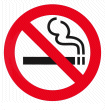ATLANTA, GA (PRWEB) DECEMBER 29 2003--Of the estimated 50 million Americans who are still smokers, the majority—70 percent—want to quit.
Smoking cessation experts agree that year-end is a good time for smokers to stop. Noel Griese, author of the book “Avoiding Lung Cancer,” urges smokers to do just that. He recommends that smokers make a New Year's resolution right now to quit for good!
For those who successfully break the habit, benefits are immediate. Within hours, blood cells that were transporting carbon monoxide from tobacco smoke begin transporting healthy oxygen. After a year of remaining smoke-free, the smoker’s risk of heart attack drops by half. After five to ten years, risk of lung cancer drops dramatically.
While smokers who quit can pride themselves on regaining control of their health, a more important benefit is extended lifespan. Smoking has been shown on average to shorten the lives of males by 13.2 years and of females by 14.5 years. One of the cheapest ways to extend lives is by helping smokers to stop. “Studies show that even smokers over 70 who quit extend lifespan,” he notes.
"Smoking is an addiction that is extremely difficult to overcome,” Griese admits. “It takes only three cigarettes to get someone hooked, which helps explain why so many teenagers become addicted. It is now accepted that the addictive power of smoking is on a par with heroin or cocaine addiction. But while society recognizes that heroin and cocaine addicts and alcoholics need intensive treatment, the same is not true for those addicted to tobacco."
He says that for every 20 smokers who try to kick the habit on their own, only one is likely to be successful at quitting for good. He advises people who want to stop to never quit trying. “It may take three or more attempts before you break the habit for good," he cautions.
The odds of success can be considerably improved. "Several treatments at least double the success rate of smoking cessation," he emphasizes.
Griese says research shows the six FDA-approved medications
designed to help smokers quit—nicotine
patch, gum,
nasal
spray, inhaler and lozenge or bupropion (Zyban)—improve
the odds of successfully quitting. Some of these are available
over the counter. Others require a doctor’s prescription.
"All of these products reduce unpleasant nicotine withdrawal
symptoms, including cigarette cravings," he says.
Going to a smoking-cessation clinic for behavioral counseling has been shown to be as effective as using the various medications.
For the best chance of quitting, try a combination of counseling and medication, suggests Griese, who's a past state director of the American Cancer Society and American Lung Association.
He suggests that people who resolve to quit visit www.smokefree.gov for copies of "Forever Free" booklets. Free quit smoking programs are available from a number of groups. Some are available at www.cancer.org, www.lungusa.org or www.americanheart.org. Griese’s book, another aid, can be located at www.anvilpub.com or by putting the words “Avoiding Lung Cancer” into a Web search engine. The book is available at bookstores and on line.
###









